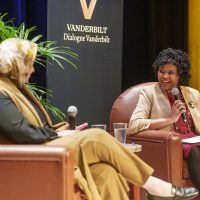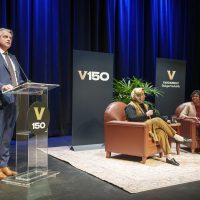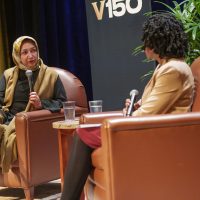Interfaith Networks Group founder Maha Elgenaidi and Vanderbilt Divinity School Dean Yolanda Pierce shared a stage Monday night to give voice to the challenges of religious literacy, unlearning biases and engaging in interfaith discussions in today’s climate of increasing Islamophobia and antisemitism.
The conversation, second in a Dialogue Vanderbilt series that brings prominent faith leaders to campus, continued its mission of cultivating open discussions about faith and how it influences people dealing with pressing societal issues.
Vanderbilt Chancellor Daniel Diermeier opened the event by acknowledging the ongoing humanitarian crisis in the Middle East and the challenges faced by community members affected by the conflict, along with the climate of rising Islamophobia and antisemitism. He welcomed Elgenaidi: “She brings her broad and vital experience to us now, when the global and national moment calls upon us to affirm, uplift and enact our core values with urgency.”
Elgenaidi, visiting Nashville from the Bay Area, shared her journey into faith-based work, highlighting a pivotal moment when a hate incident stirred her to address misconceptions and stereotypes surrounding Arabs and the Islamic faith.
Those misconceptions, among others, are alive today, and Elgenaidi emphasized the importance of addressing their root causes to combat all stereotypes, including colonial narratives, anti-Blackness and today’s pervasive anti-Muslim sentiments. Elgenaidi and Pierce discussed the ongoing work of combating these stereotypes, even among the communities upon which the stereotypes are cast.
“For me, countering [stereotypes] was through reading, engaging with Muslims and just trying to understand this community better, and it brought home everything I was reading about other religions, as well,” Elgenaidi said. “It’s inclusive of Christianity, Judaism, Hinduism, Buddhism, and that’s what attracted me about the religion, as well, is that it does have a theology of pluralism.”
Pierce and Elgenaidi also explored the complexities of the Middle East conflict, acknowledging the difficulty of navigating conversations around Hamas and Israel. Elgenaidi stressed the significance of finding common ground on fundamental issues, such as a two-state solution and the importance of negotiations and diplomacy. She also emphasized that the conflict and disagreements surrounding it are primarily political in nature, as opposed to religious.
“As far as the Hamas-Israel issue, it’s not work that I do but because of the friendships I have it’s much easier to have conversations with my Jewish friends and colleagues,” Elgenaidi said. “We’re able to work together on common interests and concerns: Islamophobia and antisemitism, religious and cultural accommodations in the workplace and schools, national security issues. I’ve come to their aid when they’ve needed me speak out against antisemitism, and they’ve come to our aid when we’ve asked them to condemn Islamophobia. So that has been incredibly successful.”
Addressing the current cultural climate, Elgenaidi discussed the challenges of distinguishing between free speech and hate speech, emphasizing the need for open conversations and the dangers of equating all Palestinian critique of Israel with support for Hamas.
“I think there needs to be a meeting that happens between Jewish groups, Muslim groups and Arab groups that are using these slogans and have a conversation about what is meant by them and how [other groups] receive it,” Elgenaidi said. “What’s been happening, for example, in West Bank and Gaza towards the Palestinians is horrific, but so is the history of what’s been happening to Jewish Americans. It doesn’t help us to continue throwing fuel to the fire. We need to find ways to bring the two groups together towards peace.”
During the Q&A section, audience questions ranged from religious education on college campuses to building cross-cultural and interfaith relationships. Elgenaidi encouraged colleges to continue promoting religious literacy and expressed hope in students and “ordinary people”—not just activists—working toward understanding one another.
In the closing remarks, both speakers highlighted the importance of acknowledging others’ pain and of learning about diverse faiths and viewpoints to dispel misconceptions. Pierce asked Elgenaidi what gives her hope, to which she said, “As a person of faith, I believe all is in God’s hands.”
Pierce expressed hope in the Vanderbilt community’s efforts to work toward common understanding, reflected in students’ willingness to reach out, bridge divides and foster understanding among diverse communities—including attendance at the event.
The Feb. 19 conversation, hosted by the Vanderbilt Project on Unity and American Democracy, is part of the university’s Dialogue Vanderbilt initiative, which works to provide a range of programs to students, faculty and the public that promote civil discourse and better understanding while addressing political polarization. The Unity Project is organized around seven foundational pillars with themes that span the breadth of issues facing the world today. This conversation falls under the pillar, Under God: The Role of Religion in a Divided Time.



